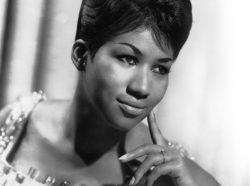
During Women’s History Month we pause to remember and celebrate the achievements of iconic women who positively contributed to shaping the social fabric of America.
One such woman is the spectacular singer, Aretha Franklin. She is still affectionately known as the “Queen of Soul” to her countless millions of fans and others worldwide who span generations of every race, color, gender, age and ethnicity.
While Aretha reached new heights in the music industry for women in general, and women of color in particular, she was also much more than a soulful voice. Aretha transcended gender and race to reach countless millions of people worldwide.
Below is an excerpt from Chapter 38 of my latest book, “Keepin’ It Real: Essays on Race in Contemporary America” (University of Chicago Press). https://www.press.uchicago.edu/ucp/books/book/distributed/K/bo40060337.html
Life and Legacy
On August 16, 2018, the world lost one of the greatest singers of all time. Aretha Louise Franklin, the Memphis-born, Detroit-raised singer passed away at the age of 76.
Franklin had one of the most distinguished voices ever. For more than half a century, her music etched itself into popular culture as readily as the air we breathe and the water we drink.
For many of us, her music was an essential part of our lives. Her songs nourished our minds, souls, and body. After all, she was indeed the “Queen of Soul!” Aretha made you move, jump, snap your fingers, move your shoulders, bob your head, and shuffle your feet.
In short, your entire body was invigorated at some level when Ms. Franklin sang. Indeed, I am one who sang out loud when listening to her music. You could dance to “Freeway of Love,” feel the intense authenticity of “Ain’t No Way,” or get your sensual groove on with “Baby I Love You” and “Dr. Feelgood.” My personal favorite was “Angel.”
Aretha knew how to touch your emotions. For some of us, listening to her music was like going to church.
Earning Respect
In 1967, millions of American women cheered when she powerfully belted out the words R-E-S-P-E-C-T. Her vocal performance was so dynamic and powerful.
“Respect” was originally recorded by Otis Redding.
Redding’s song discussed how a woman should respond to and treat the man in her life. However, Franklin, with an undeniable maturity and unrestrained confidence, took Redding’s message, went on the offense, and produced a revised version that became both a feminist and civil rights anthem.
The song became a classic. After hearing Aretha’s version, Redding joked, “That girl stole my song.”
Social Justice Activist
Aretha grew up in Detroit’s New Bethel Baptist Church, where her father, the legendary C. L. Franklin delivered powerful, in some cases, gut-wrenching sermons from the pulpit.
More than a few people believe that she adopted her father’s unflinching style in the manner that she sang. The young Aretha had the good fortune to grow up in an environment under the shadow of some of the most prominent Black singers and clergy of the mid-twentieth century. Dinah Washington, and the legendary Mahalia Jackson (my grandmother’s favorite singer) and others were frequent visitors to the Franklin home and church.
There is strong reason to assume that being in the presence of such strong, impervious, Black women like Lena Horne, Hazel Scott, Odetta Holmes accounted for her unapologetic and fierce commitment to the cause of social justice in all its forms.
While not overtly political, Franklin was astute to the power of her platform and used her voice for more than just belting out songs and entertaining audiences. She was a proud and strong advocate for the Black community, in particular, Black women. She employed her feminist activism sensibilities in a manner that produced real, concrete results.
Unlike some artists of color who tried to walk a middle line in an effort to not offend White sensibilities, she comfortably luxuriated in her authentic Blackness in both her music and activism, and did not apologize for it.
One of a Kind
From the late 1960s up until the mid-1970s, Aretha was a perennial force in the music industry and frequently dominated the charts and award shows.
By the mid-1970s, her career cooled off somewhat and other Black female singers such as Roberta Flack, Freda Payne, Donna Summer, and others were becoming equally popular with the public.
The standstill was short lived as she ferociously rebounded in the mid-1980s with chart topping hits such as “Freeway of Love,” “Jump To It,” and “I Knew You’d Be Waiting for Me,” with the late George Michael. In later years, she was a routine presence at many significant venues. She performed for three US presidents and sang for Pope Francis in 2015.
Who can forget her spellbinding, tour de force performance that bought the house down at the 2015 Kennedy Center Honors where she sang her iconic “You Make Me Feel Like a Natural Woman,” as she paid tribute to Carole King.
Yes, there will be future singers and performers endowed with exceptional talent, but the undisputed truth is that Aretha Franklin was one of a kind. As I see it, there will never be another performer like her.
On June 30, 2018, she was laid to rest. The sounds of heaven are a lot more soulful now as Aretha sings with her new angelic family. Rest in peace, Ms. Franklin.
___________________________________________________________________
“Keepin’ It Real” is available in paperback and Kindle on Amazon and via major book retailers everywhere. https://www.amazon.com/Keepin-Real-Essays-Contemorary-America/dp/1789380502
Check out the ADR book review https://americandiversityreport.com/category/black-history-month-keepin-it-real-on-race-by-david-b-grinberg/
- Israel and Free Speech on America’s Campuses – by Elwood Watson - December 5, 2023
- RIP John Lewis – By Elwood Watson - July 31, 2020
- Juneteenth Message – by Elwood Watson - June 18, 2020
